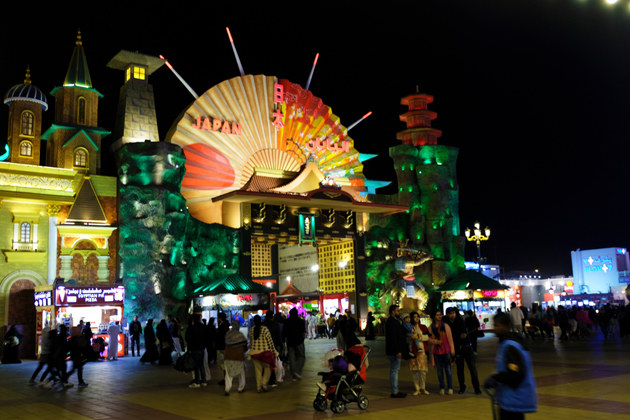LONDON: Japan and Gulf countries are building on their economic ties with new projects of mutual benefit, from headline-grabbing deals to a commitment to long-term partnerships.
An indication of the buzz that surrounds the two countries’ relationship is the speculation that Saudi Arabia is considering Tokyo as the international site for Aramco’s IPO, which is expected to be the largest in history.
A more concrete and equally attention-grabbing example of the growing relationship between the countries has been Saudi Arabia’s investment in SoftBank’s Vision Fund, owned by Japanese businessman Masayoshi Son.
Saudi Arabia’s sovereign wealth fund, the Public Investment Fund, is one of the largest investors in the Vision Fund, and Son is expected to invest heavily in the Kingdom in the coming years.
Such ventures form part of the two nation’s plans for close economic partnership, which have been formalized under Saudi-Japan Vision 2030 – part of the crown prince’s Vision 2030 that aims to diversify Saudi Arabia’s economy.
Saudi Arabia and Japan have historically been close because of the latter country’s dependence on oil. Japan, which is lacking in natural resources, imports 85 percent of its oil from the Gulf, of which 40 percent comes from Saudi Arabia.
Interestingly, the Saudi public underestimate Japan’s dependence on their country’s oil. A poll by YouGov and Arab News found that only 32 percent of Saudis are aware that in 2018 the GCC produced 85 percent of Japan’s oil, with 49 percent of respondents placing the figure much lower at 40 percent.
All indications are that the partnership between Japan and the GCC will continue to grow. Looking at recent trends, there is reason to be optimistic about prospects for expanding economic cooperation in the future.
For instance, Japan was Dubai’s seventh largest trading partner in 2018, with bilateral non-oil trade increasing by 44 percent to reach $11 billion last year, compared to 2011.
The number of Japanese companies registered with Dubai Chamber has risen steadily to 131. These figures reflect a growing confidence in Dubai as a preferred business hub attracting Japanese firms and investors looking for growth opportunities.
Commenting on UAE-Japan business relations, Hamad Buamim, president and CEO of Dubai Chamber of Commerce and Industry, said: “Dubai-Japan ties have gone from strength to strength in recent years, supported by high-level visits from both sides, the easing of visa restrictions, the expansion of direct flights between the two countries and the signing of strategic cooperation agreements.”
As for Saudi Arabia, its growing relationship with Japan is largely a result of its efforts to transform its economy away from oil, as embodied in its Vision 2030 plans.
When the Saudi-Japan Vision 2030 project was formally announced in March 2017, a publication on the proposals from the Saudi Ministry of Foreign Affairs highlighted Japan as the “ideal partner” for Saudi Arabia as it “seeks opportunities to diversify and strengthen its economy by capitalizing on advanced and cutting-edge technologies,” due to its “knowledge capital, and technological competitiveness.”
For Japan’s part, “the Saudi-Japanese cooperation would help the Japanese economy identify and develop opportunities to further upscale Japanese investments in Saudi Arabia.”
A good example of this type of economic exchange is Saudi Arabia’s investment in SoftBank’s Vision Fund, which in turn will see SoftBank investing in Saudi’s new high-tech city NEOM.
Some commentators see Saudi Arabia looking to Japan as a model as it moves beyond oil toward technology and “knowledge-intensive” industries. Writing in the Japan Times last month, Kent E. Calder, director of the Reischauer Center for East Asian Studies at Johns Hopkins University in Washington, spoke of “how seriously the Saudis are thinking of a world beyond oil, and how significantly Japan looms as their mentor in that regard due its efficient use of resources, even though the two countries contrast sharply in their hydrocarbon reserves.”
In seeking to diversify its economy toward “knowledge-intensive” industries, Saudi Arabia is following Japan’s own move in this direction in the 1970s, Calder said.
Many of the initiatives that form part of Saudi-Japan Vision 2030 are designed to facilitate this transition. In an interview with Arab News earlier this year, Tsukasa Uemura, Japan’s ambassador to Saudi Arabia, drew attention to institutions that are helping to transfer Japanese technology and expertise to the Kingdom. These include the Saudi-Japanese Automobile High Institute in Jeddah, which teaches young Saudis to become engineers, and an industrial robotics training facility.
“Through these projects, I believe that a lot of our experience and knowledge in the field has been transferred to Saudi researchers and students,” Uemura told Arab News in June.






























